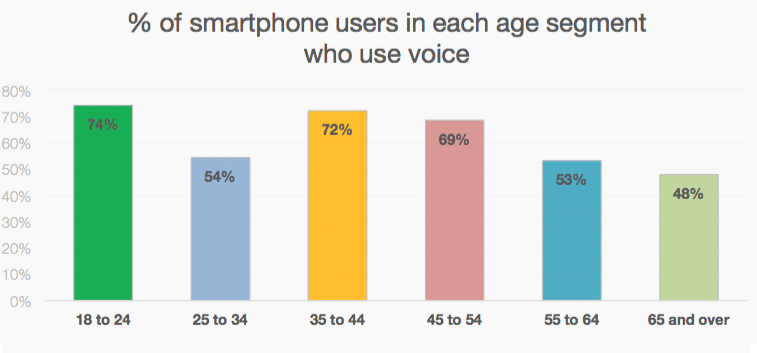Anyone else still terrified to talk to your phone in public? Apparently, you may be in the minority sooner rather than later.
The year was 1998. I had just received my driver’s license and my first cell phone. At a time when cellphones had yet to proliferate, I remember my mother saying to me, “Now remember, you’re only to use the phone in emergencies.” Little did I know that a decade later, that tiny mobile device would never leave my side.
In 2014, 87% of millennials said their smart phone never left their side, and that number has most likely increased over the past 2 years. Now, I’m technically not a millennial, but as you can see, the use of mobile devices has become interwoven with society. It’s our immediate source of information. As the speed and efficiency of these devices continues to increase, our fingers cannot keep up. Despite the dexterity of our opposable thumbs, our motor mouths are significantly more expedient at communication. That’s where voice search comes into play, the natural next step of communicating with our devices.
While it’s hard to imagine that we’ll be flirting with our AI Virtual Assistants a la the movie ‘Her,’ and I don’t anticipate buying a Robohon anytime soon, voice search is here and it’s changing the way we search. But check out Robohon for a pick me up:
Like an arms race, search behemoths Google, Apple, Amazon, and Microsoft are competing to develop the most effective voice search for the billions of internet surfers out there.
Join me, as we explore:
- How does Voice Search work?
- Who is already using Voice Search?
- Who are the major players and how is the competition shaping up?
- How will Voice Search impact businesses?
What is Voice Search, Why is it Important and Who uses it?
Getting Technical
Voice Search is complex. Desktop typed search presents the original challenge of delivering the right content, to the right people, at the moment they need it.
Search Engines use a combination of intricate codes that search for patterns – algorithms – and the existing information publically available on the internet – knowledge graphs.
A second layer of complexity for search engines is added when you consider mobile search and the need for contextual information relevant to your location. A couple years ago, Google began beefing up their algorithms to serve location based queries including phrases like ‘near me,’ making contextual location based searches more useful for local searches.
Our newest addition to the search engine layer cake, voice search, needs to take into consideration your voice, your accent, your conversational tone, phonetics, and any ambient sounds to deduce what you’re searching for.

Who uses Voice Search
While we all have become accustomed to seeing people taking calls via bluetooth ear pieces, the actual data of people using voice search is surprising. Take a look at this 2015 survey from MindMeld:

Source: LSA Insider
As much as half the population – across the board, no matter the age – use voice search. The numbers are snowballing, with 60% of people only starting to use voice search in the previous 12 months. For businesses, this means you need to begin thinking about how this new search paradigm will impact your search marketing.
Context and Usefulness
Voice search will continue to become more useful than relying on type. First off, speaking into your phone in lieu of typing is more efficient and faster. However, over the last 20 years, we’ve conditioned ourselves to search for specific keywords or phrases, because we knew that search engines weren’t smart enough to decipher entire questions.
We learned that typing in ‘song lyrics Little Red Corvette’ would produce a more accurate result than ‘What are the lyrics to Little Red Corvette?’
But now that search engines are catching up in complexity, taking into consideration the context of our questions, they allow us to return to a more natural way of searching for answers. We can use natural speech, and search engines are better at understanding the context of what we mean.
Who are the current Voice Search ‘players’?
Siri (Apple)
Siri, the Apple voice search concierge, pushed to market faster than its competitors, but that doesn’t necessarily make it the best product. Launched in 2011, Siri was a fun novelty out of the box, answering silly questions and helping with very basic tasks. Apple then began to integrate Siri with other apps on the iphone, allowing Siri to offer a range of useful voice activated tasks.
A big change happened for Siri in 2014, when Apple dropped Google for Bing as the data source for much of Siri’s information. You can still use Google via Siri, but you need to say ‘Google’ in your query. Since Apple doesn’t pursue advertising revenue in the same ways that Google and Microsoft do, and doesn’t have their own search engine, it will be interesting to see how the voice search assistant stacks up in the future.
Google Now (Google)
Google Now has the biggest advantage over its competitors when it comes to Voice Search. It’s the king of the hill, with a gold mine of data powering its own search engine. With years of research and innovation, not to mention all of the personal data that’s been collected, Google has a major advantage taking your personal context into consideration when showing results.
If you’re the type of person that is hypersensitive to the privacy of your data, you won’t be able to benefit from Google’s enhanced search. That’s the philosophical trade off people will need to make in the future. Is it worth it to share my data for a more personalized and accurate search experience?
While Google isn’t quite at Siri’s level in terms of understanding natural speech, there’s no doubt they will catch up soon. As Google improves algorithms for local search, Google Now will be better at serving better recommendations than Siri.
Cortana (Microsoft)
Cortana arrived later to the game than Siri and Google Now, but it has some features that differentiate it from its competitors. Unlike Siri, Cortana has been included on desktop devices. Since Voice Search is still in its infancy, for the time being, Cortana holds the desktop Voice Search advantage.
Additionally, Cortana can keep track of a list of preferences you program into her. Similar to Google Now, Cortana will take your preferences into consideration within the context of your searches. Knowing your likes and dislikes allows Cortana to ‘potentially’ provide more custom tailored results.
Echo aka Alexa (Amazon)
And finally, the newest player in the Voice Search landscape, Amazon’s Echo, or should we say Alexa?
Amazon’s Voice Search assistant isn’t as focused on search as it’s meant to interact with the devices around you. As more appliances and electronics become wirelessly connected, Alexa aims to be the device you use to control all of your other devices.
Don’t be shocked if Alexa enhances search, but since it’s a fixture of your home, the main implication the assistant will have for businesses is via e-commerce purchasing.
How will Voice Search Impact Businesses?
Now that we have a good sense of how Voice Search works, why it’s important, and who the major players are, we can begin to think about how this will impact businesses. Voice Search will influence how businesses approach SEO and local search.
Micro Moments
The key to capitalizing on Voice Search is what Google refers to as ‘micro moments.’ Google describes micro moments as those moments “when we want or need something, we tune in via convenient, self-initiated bursts of digital activity.” It’s the intersection between intent, immediacy and context.

Source: Google
In those moments, when someone is using their digital device to go somewhere, do something, or learn something, they’re showing intent. Google recommends three important strategies to win these micro moments:
Be there
When people are searching for something related to your industry, make sure you show up in the results by tailoring your content to what people may be looking for.
Be Useful
If you are there when people search, make sure that the content that you’re providing is useful and solves whatever immediate need the searcher has.
Be Quick
Not only is it essential that your site is fast loading, the user experience needs to be seamless. Searchers need to be able to easily find the content they’re looking for when landing on your site without having to click 2, 3, or 15 more links to get the to the desired information.
As a business, you can get ahead of the game with a bit of preparation and implementation. Not many organizations are preparing for the micro moment revolution.
Speed and Mobile Optimization
Google and other search engines want to provide the best user experience for their audience. That means that they want to make sure that people are able to get the information they’re looking for as quickly as possible and formatted for easy consumption.
There are two main ways to address these needs:
- Make sure your site is as fast as possible.
- Consider implementing Google’s new AMP technology.
- Keep your site structure clean and unimpeded by various plugins.
- Optimize images using small file types and compression tools.
2. Make sure your website is mobile friendly.
- Google will boost your site if it’s mobile friendly and penalize if it’s not.
- Most Content Management Systems (like WordPress or Magento) provide responsive themes. As long as your site is responsive, it will look great on mobile devices.
How to Address Natural Language Search with Your Content
Since people are returning to more natural ways of speaking to their phones via voice search, your business can use your content to answer questions.
Have an FAQ page that answers questions using natural language.
When people use voice search, they tend to phrase their search in the form of a question. If you’re a craft store and users are asking ‘Where is the best craft store near me?’ or ‘How do I make a birdhouse?’ You’re going to want to make sure you answer these actual questions on your FAQ page in conversational language.
Not only will your content more likely be served to the people searching for you, there’s the chance that Google will decide that your answers are the best out there. If that’s the case, Google may use your structured information in their snippets, which highlight your company as the authority on that topic.
Use Long-Tail Keywords in your Ad Campaigns
Since people are no longer using simple keywords in their voice searches, your business has the opportunity to capture their attention with longer question based keyword phrases. Implement these When, Where, How questions in your search terms so your ads are served in those micro moments.
Write blog posts that answer the FAQ questions
The simple frequently asked questions page will help you rank better, but if you produce a comprehensive blog post about that same FAQ question, you’re more likely to be seen as an authority on the subject by Google.
Takeaways
Search paradigms are changing with the proliferation of Voice Search. As a business, it’s a great opportunity to step ahead of your competitors by preparing for the changes in the way we search.
Make sure you have a fast website, optimized for mobile. Create an FAQ page that uses conversational language to answer the most often received questions. Use contextual long-tail keywords including intent words like ‘Where’ and ‘How to’ in your ad campaigns. Write longer blog posts that answer your FAQs in greater depth.
You won’t be seeing artificial intelligence like in the movies Her, Ex Machina, or the TV show Person of Interest anytime soon, but interacting with Voice Search will continue to become the most efficient and useful way we find information.
About the Author
Garrett Sussman
Garrett is the Head of Marketing at Grade.us, an online review management and marketing platform. When he's not crafting content, he's scouting the perfect ice coffee, devouring the newest graphic novels, and concocting a new recipe in the kitchen.












